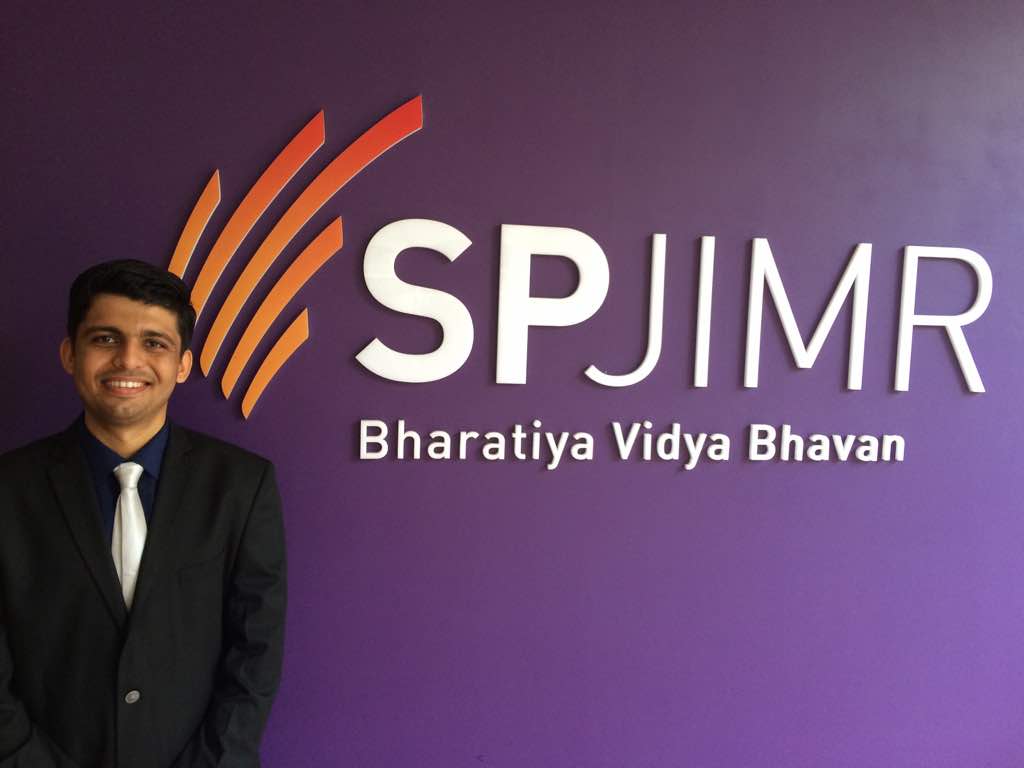Moving away from the herd of other b-schools, who have been following the unknown pied pipers for decades, SPJIMR in its persistent mission of synthesizing competition-based Western efficiency and collaboration-centric Eastern ethos introduced a new course called “Management and Liberal Arts (MaLA)”. The course is designed, developed and taught by Dr. Makarand R. Paranjape, the noted author, poet and Professor of English at Jawaharlal Nehru University, and the esteemed faculty of SPJIMR Prof. Vineeta Dwivedi. The course is based on four major themes, Creativity (Kalpana), Quality (Tatva), Aesthetics (Rasa) and Rhetoric (Samvad).
From the wisdom of Nisargadatta Maharaj to the Apology of Plato, from the landmark speeches by Mark Antony and Martin Luther King to the celebration to God’s glorious creation powers through popular Bollywood songs like “Kun faya Kun”, the liberal arts course embarked us on a journey of developing the Right side of the brain. The deep dark caves of Plato taught us to distinguish between people who mistake sensory knowledge of the truth and the people who really see the truth while the learnings from the Zen and the Art of Motorcycle Maintenance taught us about the metaphysics of quality and illustrated the act of bravery in case of unimaginable sufferings.
Every lecture brought about some new learnings from eastern and western classics, which enthralled not only the students but also the faculty from different domains who also attended classes with us. After every session, there was a dialogue amongst the faculty or what was more popularly known as “Coffee with Makarand” about their opinion and viewpoint on liberal arts. One of the highlights of the course was the visit by noted author Amish Tripathi who embodies success in Liberal Arts which gave us the inspiration to delve deeper into the subject and understand its nuances.
Throughout the journey of this course, one thing that was common amongst the students was the everlasting doubts about the significance of this course in making them better managers. After all, however diverse the backgrounds from which the students hail, a large portion of them are from engineering and mathematics background and are used to structured problem-solving. When asked about this, Prof. Paranjape politely replied, “I don’t know. It’s up to you to decide what to take home from this course”. These words captured in many ways the essence of this course, which is to think critically, to question the status quo and to have an objective opinion about everything around us.
Learning liberal arts helps in stimulating the right side of the brain. Unlike the left brain which is more analytical and follows the step-by-step approach to problem-solving, the right brain is more intuitive, thoughtful and creative. Just as we recognize the face of a friend instantly and intuitively rather than by analyzing each feature step by step, learning liberal arts and integrating it with management could be extremely useful in creating building not only good products and services but learning the traits that would be essential for the managers of tomorrow such as empathy, compassion and creativity. As the world is increasingly becoming entrepreneurial, there is an increasing need for a right-brained approach to break out of the traditional hierarchies and create something different.
Henry Ford once said, “If I had asked my customers what they wanted, they would have said, a faster and a more reliable horse.” The knowledge that is being imparted in b-schools is based on various frameworks and models which are centred on asking customers about what they want and based on those insights products and services are created. It should rather be focused more on experimentation and out of the box thinking. The two years in a b-school should provide a safe environment equivalent to a simulation of the real time business scenarios wherein the students have the freedom to come up with ideas however weird or lateral they may be and make it their playground of experimentation.
Has SPJIMR been able to beat the rubber band theory of personality, propagated by the bestselling author Susan Cain? Has it been able to create an experience which is relatable to students from each walk of life and who can develop the ability to think in a creative and an innovative manner, while keeping the value of diversity at core? We must let time be the judge of it, but for now learning about the facets of Kalpana (Creativity), Tatva (Quality), Rasa (Aesthetics), Samvad (Rhetoric) in Liberal Arts, we realised that these aspects have always manifested in our lives in some form or the other. This course re-iterated its importance to us and opened new windows for us to see the significance at a larger level. Through this it fueled the curiosity in our minds to know more and learn more. We still have to tread a long path in imparting a balance of critical and creative thinking skills. Rather than focusing on developing the most optimum solution and working on “ideal” business solutions, they should focus on developing a worldview which can help create new and out of box ideas.
About the Author:

Vivek Nandwani is a PGDM candidate at SPJIMR, Mumbai specialising in Operations and Supply Chain Management. An avid reader who also loves to write in his leisure time, he was worked with Cairn Oil and Gas before joining SPJIMR.


















Comments
Rahul Mukherjee
Rahul Mukherjee is a PGPM 2018-20 candidate at MDI Gurgaon.
Wonderfully written!
14 Jan 2018, 06.40 PM
+Read Replies (1)
Vivek Nandwani
Thanks a lot Rahul. Glad you liked it!!
15 Jan 2018, 01.38 AM |
Alok Pandey
Alok is pursuing PGDM in Operations and Supply Chain Management from SPJIMR, Mumbai. Alok has graduated in Mechanical Engineering from NIT Kurukshetra. Prior to joining SPJIMR, Alok worked for 3 years with Nestle India Limited at Ponda Factory in Goa as Energy Engineer. His job role encompassed management of energy and water consumption at factory level and maintenance of Industrial Services. Alok has special interest in social causes especially education and contributes to the same in his capacity. He has been involved in Shiksha, an initiative in his Alma Mater to educate the not-so-privileged children living in and around the campus.
How beautifully put together, kudos Vivek.
15 Jan 2018, 01.15 AM
+Read Replies (1)
Vivek Nandwani
Thanks a lot Alok.
15 Jan 2018, 01.38 AM |
Navdeep Agarwal
Well thought article Vivek! Cheers!
15 Jan 2018, 01.22 AM
+Read Replies (1)
Vivek Nandwani
Thanks Navdeep. Glad you liked it
15 Jan 2018, 01.38 AM |
Vandana Sharma
Very well written!
15 Jan 2018, 05.58 PM
+Read Replies (1)
Vivek Nandwani
Thanks Ms. Vandana Sharma.
15 Jan 2018, 09.58 PM |
KARISHMA NANDWANI
Compliance Manager
Beautifully written Vivek!!! Really a good read!!!
23 Jan 2018, 10.45 AM